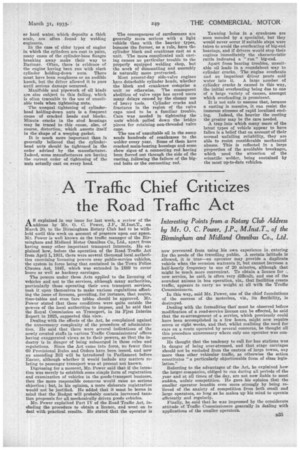A Traffic Chief Criticizes the Road Traffic Act
Page 49

If you've noticed an error in this article please click here to report it so we can fix it.
Interesting Points from a Rotary Club Address by Mr. 0. C. Power, IP., M.Inst.T., of the Birmingham and Midland Omnibus Co., Ltd.
AS explained in our issue for last week, a review of the address by Mr. 0. C. Power, J.P., 111.Inst.T., on March 20, to the Birmingham Rotary Club had to be withheld until this week on account of pre,ssure upon our space. Mr. Power is well known as the traffic manager of the Birmingham and Midland Motor Omnibus Co., Ltd., apart from having many other important transport interests. He explained how, before the operation of the Road Traffic Act from April 1,1931, there were several thousand local authorities exercising licensing powers over public-service vehicles, the system in force being that contained in the Town Police Clauses Act, 1847, which was extended in 1889 to cover buses as well as hackney carriages.
The powers under these Acts applied to the licensing of vehicles and not to the services although many authorities, particularly those operating their own transport services, took it upon themselves to make various regulations affecting the issue of licences, providing, for instance, that routes, time-tables and even fare tables should be approved. Mr. Power stated that these conditions were quite outside the powers of the local authorities to impose, and he said that the Royal Commission on Transport, in its First Interim Report in 1925, supported this view.
Dealing with the effects of the Act, he complained against the unnecessary complexity of the procedure of administration. He said that there were several indications of the newly created staffs in various Traffic Commissioners' offices having exaggerated views as to their powers, so that the industry is in danger of being submerged in these rules and regulations. Since the Act came into force, no fewer than 60 Provisional Rules and Orders have been issued, and now an amending Bill will be Introduced in Parliament before Easter, although whether it would include any matters relating to passenger transport was at present not known.
Digressing for a moment, Mr. Power said that if the intention was merely to establish some simple form of registration and examination of vehicles in the goods-transport business, then the more responsible concerns would raise no serious objection ; but, in his opinion, a more elaborate registration would not be justified. He added that it must be borne in mind that the Budget will probably contain increased taxation proposals for all mechanically driven goods vehicles.
Mr. Power explaihed Part IV of the Road Traffic Act, including the procedure to obtain a licence, and went OR to deal with practical results. He stated that the operator is
now prevented from using his own experience in catering for the needs of the travelling public. A certain latitude is allowed, it is true—an operator may provide a duplicate vehicle when the occasion warrants it, but cannot increase a half-hourly frequency to one of 20 minutes, although that might be much more convenient. To obtain a licence for .1. new service, he said, is often very difficult, and one of the soundest axioms in bus operation, viz., that facilities create traffic, appears to carry no weight at all with the Traffic Commissioners.
In this way, said Mr. Power, one of the chief foundations of the success of the motorbus, viz., its flexibility, is destroyed.
Dealing with the formalities that' mustbe observed before modification of a road-service licence can be effected, he said that the re-arrangement of a service, which previously could have been accomplished in a few hours, might now require seven or eight weeks, and that, whilst realizing the need for care on a route operated by several concerns, he thought all this procedure unnecessary where only one operator was cow cerned.
He thought that the tendency to call for bus stations was in danger of being overstressed, and that stage carriages should not be excluded from the centres of large towns, any more than other vehicular traffic, as otherwise the action constitutes " a particularly objectionable form of class legislation."
Referring to the advantages of the Act, he explained how the larger companies, obliged to run during all periods of the year and at all times of the day, are not now liable to meet sudden, unfair competition. He gave his opinion that the smaller operator benefits even more strongly by being relieved of the anxiety of competition from both small and large operators, so long as he makes up his mind to operate efficiently and regularly.
Finally, he said that he was impressed by the considerate attitude of Traffic Commissioners generally in dealing with applications of the smaller operators.




























































































